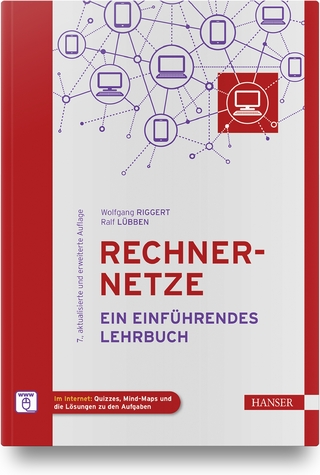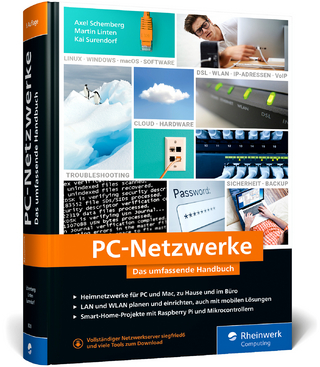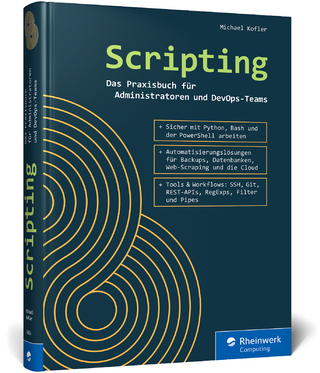
Emerging Technologies for Combatting Pandemics
Auerbach (Verlag)
978-1-032-32828-7 (ISBN)
The COVID-19 pandemic has significantly affected the healthcare sector across the globe. Artificial Intelligence (AI) and the Internet of Medical Things (IoMT) play important roles when dealing with emerging challenges. These technologies are being applied to problems involving the early detection of infections, fast contact tracing, decision-making models, risk profiling of cohorts, and remote treatment. Applying these technologies runs against challenges including interoperability, lack of unified structure for eHealth, and data privacy and security. Emerging Technologies for Combatting Pandemics: AI, IoMT, and Analytics examines multiple models and solutions for various settings including individual, home, work, and society. The world’s healthcare systems are battling the novel coronavirus, and government authorities, scientists, medical practitioners, and medical services are striving hard to surmount these challenges.
This book focuses on the design and implementation of AI-based approaches in the proposed COVID-19 solutions that are enabled and supported by IoMT, sensor networks, cloud and edge computing, robotics, and analytics. It covers technologies under the umbrella of AI that include data science, big data, machine learning (ML), semantic technologies, analytics, and cyber security.
Highlights of the book include:
Epidemic forecasting models
Surveillance and tracking systems
IoMT and Internet of Healthcare Things-based integrated systems for COVID-19
Social network analysis systems
Radiological image- based diagnosis systems
Computational intelligence methods
This reference work is beneficial for interdisciplinary students, researchers, and healthcare and technology professionals who need to know how computational intelligence could be used for surveillance, control, prevention, prediction, diagnosis, and potential treatment of the disease.
Dr. M. Rubaiyat Hossain Mondal is a Professor in the Institute of Information and Communication Technology (IICT) at Bangladesh University of Engineering and Technology (BUET), Bangladesh. Dr. Utku Kose is an Associate Professor in Suleyman Demirel University, Turkey. Dr. Surya Prasath is a mathematician with expertise in the application areas of image processing and computer vision. Dr. Prajoy Podder is a researcher at the Institute of Information and Communication Technology, Bangladesh University of Engineering and Technology. Dr. Subrato Bharati is a researcher at the Institute of Information and Communication Technology, Bangladesh University of Engineering and Technology. Dr. Joarder Kamruzzaman is a Professor at the School of Engineering, Information Technology and Physical Sciences, Federation University, Australia.
Foreword. Preface. Acknowledgments. About the Editors. List of Contributors. 1 Artificial Intelligence Leveraged Internet of Medical Things and Continuous Health Monitoring and Combating Pandemics within the Internet of Medical Things Framework. 2 Assessing the Economic Impact of COVID-19. 3 Assessing the Economic Impact of COVID-19 on the Implications of the Internet of Things Adoption on Small and Medium Enterprise Business’s Sustainability. 4 Impact of COVID-19: Insights from Key Sectors of the Indian Economy. 5 Future Scope of Artificial Intelligence in Healthcare for COVID-19. 6 Patient Recovery and Tracing Repercussions for COVID-19 in Discharged Patients. 7 The Impact of COVID-19 on the Maritime Economy: A Study on Bangladesh. 8 Intelligent Optimization and Computational Learning Techniques for Mitigating Pandemics. 9 Various Deep Learning Methodologies for COVID-19 Diagnosis. 10 Hybridization of Decision Tree Algorithm Using Sequencing Predictive Model for COVID-19. 11 CoVICU: A Smart Model for Predicting the Intensive Care Unit Stay of COVID-19 Patients Using Machine Learning Techniques. 12 Long Short-Term Memory-Based Recurrent Neural Network Model for COVID-19 Prediction in Different States of India. 13 Dengue in the Presence of COVID-19: Evaluation of Tree-Based Classifiers Using Stratified K- Fold on Dengue Dataset. Index.
| Erscheinungsdatum | 07.11.2022 |
|---|---|
| Zusatzinfo | 32 Tables, black and white; 9 Line drawings, color; 67 Line drawings, black and white; 8 Halftones, color; 3 Halftones, black and white; 17 Illustrations, color; 70 Illustrations, black and white |
| Verlagsort | London |
| Sprache | englisch |
| Maße | 156 x 234 mm |
| Gewicht | 730 g |
| Themenwelt | Mathematik / Informatik ► Informatik ► Netzwerke |
| Mathematik / Informatik ► Informatik ► Theorie / Studium | |
| Wirtschaft ► Volkswirtschaftslehre | |
| ISBN-10 | 1-032-32828-2 / 1032328282 |
| ISBN-13 | 978-1-032-32828-7 / 9781032328287 |
| Zustand | Neuware |
| Haben Sie eine Frage zum Produkt? |
aus dem Bereich


